
A look back over Game of Thrones’s Season 5 Winterfell Plotline, by showrunners David Benioff and Dan Weiss (D&D).
Welcome to the land of no hope!
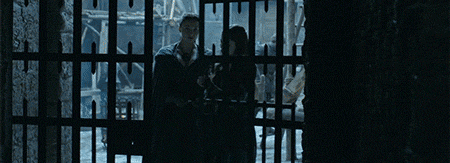
Not long ago, Julia wrote a comprehensive (and amusing) retrospective about the Dornish plotline in Game of Thrones (GoT) Season 5, the storyline that was viewed by most (Unsulllied and book readers alike) as the weakest of the entire series.
However, I can’t help but notice that Dorne is treated as an exception to GoT—as if the rest of the plotlines are great. So I want to zero in on Winterfell (from now on, called “Winterhell”) and do my own retrospective, not only because I find it to be a thoroughly offensive plotline, but because under any level of scrutiny, it makes no goddamn sense too!
I shall be tackling the same questions Julia used for Porne:
- What was the story they were trying to tell?
- Whose story was it?
- What was the result of this story, from a thematic and character perspective?
- What adaptational choices were made?
- Why did they make the adaptational choices they did?
- How did those choices change the story?
I also added my own question, after trying to dig deeper:
- What the fuck were they thinking?
What was the story they were trying to tell?
First of all, there’s defining Winterhell. I will be considering the following to be part of the plotline:
- Everything that takes place at Winterfell (duh)
- Sansa and Littlefinger in the Vale
- Brienne in the Vale and in the North
- Stannis’s campaign once he leaves Castle Black
- Littlefinger’s one scene with Cersei where they discuss Winterfell
In order to help you understand what happened, I shall need to take you through the events of the evening season, step by step.
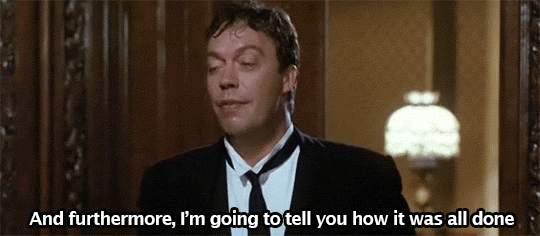
To fit with the theme of “let’s displace random people, places, and thing,” the Winterhell plotline opens in the Vale. Here, Petyr and Sansa are in the process of unloading Robin, that dead-weight. It’s not like the Vale Lords, having Robin under their control now, could actually move against Littlefinger. I mean why would they? The real Sansa trusts him and apparently that changes everything!
But it’s fine…Littlefinger has a plan. And we know this because he’s getting mail sent to him that he is being SUPER secretive about reading.
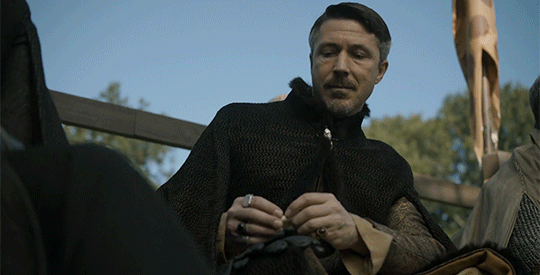
Now, with the gift of hindsight, we know what the letter says. It’s Roosey B. going, “Sounds good, let’s commit treason together.” Who couldn’t trust that to a letter? It’s not like this totally random…maester in training (no chain)?? delivered the message or anything.
And the reason I point this out is because “what can be trusted in a letter” becomes rather important later. So file that one away.
This also means Littlefinger (can I just start calling him “Batfinger” now?) was likely the person who reached out to Roose first, with no assurances that Roose wouldn’t spin around and mail that letter right to Cersei. A “betting man” indeed.
Anyway, Sansa thanks Royce for “everything he’s done for her.” Too bad that alliance on her end is going to be as useful as a patch of rotten pumpkins. I mean, wasn’t the point of getting the Vale Lords on her side that if Petyr did something she didn’t like, she had the clout to be like, “no actually he did kill Lysa LOL”? Batfinger was the devil she knew?

Whatever, who needs consistent motivation season to season. She and Batfinger pack into a wheelhouse, where Sansa astutely notes “we’re going WEST but you told Yohn we’re going EAST.” Because he wouldn’t have totally noticed this. It’s not as if the Royces are well-connected in the Vale (and have reason to be distrustful of Batfinger), or that there’s only one route to go from the Vale to Winterfell or anything. Sansa points out “no one can be trusted” and Batfinger gets a partial because WOW WHAT POLITICAL INTRIGUE HE TAUGHT HER.
Meanwhile, Brienne the Brute decides to be a giant asshole to Pod and is so busy browbeating him and declaring that she doesn’t care what happens to him that she misses Sansa going right by. Oh well. Good thing in Weisseroff lightning always strikes at least twice, and usually 4 or 5 times.
And strike, it does. The next scene. At the inn. It opens with some lovely flirtatious banter between Sansa and Batfinger…actually wait, no sorry. First we need to be reminded of how great Pod is with the ladies:
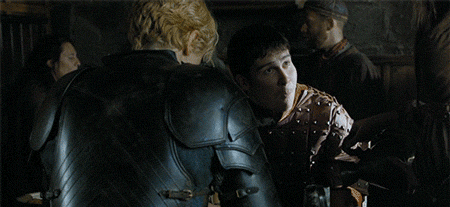
But things are kinky and charged over in Sansa’s booth too. “You got a letter.” “You are becoming an observant young lady.” Yeah, Batfinger, it’s because you gave a shifty look in every direction and read it in front of everyone! Anyway, “my marriage proposal has been accepted,” says Batfinger. Then Sansa decides that rather than following up with a question, she’s going to flirt about beer and man!taste palettes.
Across the room, Pod glimpses a flash of Sansa’s profile and recognizes her, because she’s wearing the most useless disguise in the world. He tells Brienne there are ten knights standing guard and cautions Brienne but she’s all like, “idgaf steal some horses for us, yo.” Because she’s a boss-ass bitch.
Then she announces to the entire inn “Lady Sansa!” Batfinger implies she’s been bought, and rather than be like, “yeah, remind me how you got yourself a seat in the Vale?” she just ignores him. Woman of action, not of words, amirite? Brienne then offers her protection to Sansa, but Batfinger talks over the two women and explains why she should go away. Sansa agrees because “I saw you at Joffrey’s wedding.” Brienne then is all, “I saw you there too?” but Sansa doesn’t give a shit because “sometimes we have a choice.” Is that foreshadowing to her being a “hardened woman making a choice” later? If so, how fun for us that the victim-blaming narrative starts early.
Then Batfinger wants to kill Brienne (and I guess Sansa’s cool with having just tacitly sentenced her to her death). She runs and escapes and fights a bunch of people. There’s really nothing more to say on it. Pod forgets how horses work again?
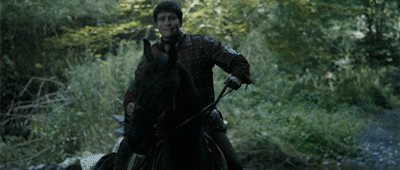
Anyway, we get our first proper Winterhell scene next! All the Bolton’s horses and all the Bolton’s men are busy prepping for Sansa’s arrival (though don’t worry, they’ll multiply to an army of 10,000 at some point) by raising flayed corpses (one of which is obviously a woman as it zooms in and pans her bloody frame) above the gate. What a great way to greet an important political guest!
Roose and Ramsay Sue are having some kind of meal, and Roose is like, “idk, maybe it’s not smart to flay everyone.” But Ramsay points out how those assholes said the Starks are the real Wardens of the North, and Roose is like, “well then, you had no choice.” Roose yells at Ramsay to stop eating, so that he can explain he’s worried about holding the North, because Lannisters have never once sent their armies that far (then how did you think this was going to play out when you stabbed Robb, buddy?).
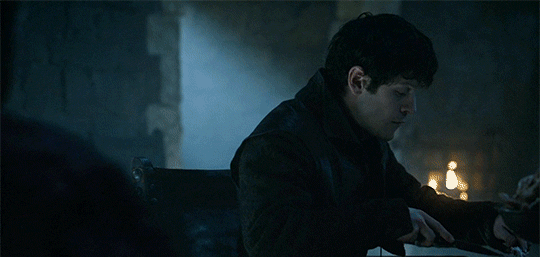
So then he explains how marriages forge lasting alliances (true), and that giving a giant middle finger to the Lannisters (from whom they’ve derived power) by marrying Sansa will solidify their hold on the North (apparently assuming Ramsay’s legitimization won’t be instantly revoked). Which…yes and no. More “yes” than “no,” but this goes back to the whole thing about Roose trusting Batfinger in the first place. Everyone’s a betting man!
We cut to Sansa and Littlefinger riding on horses, and Sansa spots Moat Cailin and just realizes where they’re headed. Because apparently she missed the Trident being on her left the entire fucking time. Or the fact that there is ONE road (the King’s Road) to go North that she’s taken before when she went to King’s Landing. Or that it’d be obvious what direction they were riding in when the sun kept setting to her left. Then Batfinger says she’s going home, and Sansa goes “your marriage proposal wasn’t for you.”
Okay. I know Weisseroff is small. So yeah, it may have taken Cat two weeks to travel from the Inn at the Crossroads to the Bloody Gate, and a hell of a lot longer for anyone to get from the inn to Moat Cailin. It’s shorter in the show, whatever. It’s still clear some time has passed though, and you’re telling me that the entire time in that stupid (and now magically disappeared) wheelhouse, Sansa didn’t think to clarify what Batfinger meant when he said “someone accepted my marriage proposal.” Like, they have been traveling together for quite a while. They had to have exhausted 97% of their stories, right? I bet Sansa was even dipping into her more boring material, like that one time Jeyne Poole (REMEMBER HER?) accidentally sewed a button too low and then the vest couldn’t close properly.
Anyway, Sansa finally finds out the real dealio about the marriage proposal a hundred years later and is like, “are you fucking nuts? They murdered my family.” To which Batfinger then reminds her of Stark Guilt™, saying “Winterhell is always your home. You’re a Stark. Dyeing your hair doesn’t change that.” Which really just served to remind us that her hair dye was utterly pointless.
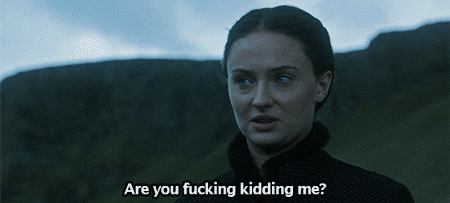
She protests, and Batfinger patiently says “…Sansa,” as if she’s a child throwing a hissy fit. She says she’d rather starve herself and die, and he’s like, “well I won’t force you, but you really should stop running and avenge your family, or else you’re just a bystander to tragedy.” Because what an asshole she was for being so passive this whole time. I guess Sansa internalized that victim-blaming narrative enough to agree to something that makes no sense? “Get revenge…by marrying them!” Okay.
Elsewhere, Brienne decides to “go around Moat Cailin” because “I know where I’m going.” Then it’s followed by a conversation between her and Pod where she’s slightly nicer to him and he’s happy to be browbeat anyway because she’s a good fighter and OMG DID YOU KNOW RENLY WAS GAY and she’s motivated by vengeance and this really has nothing to do with Winterhell so I’ll leave it there.
Somehow, despite it being very obvious that maybe a few days are passing elsewhere in this episode, Sansa and Batfinger magically arrive at Winterhell. Only Boltons seem to reside there. And the kennel master’s daughter. Sansa graciously bows to Roose and smiles at Ramsay while Myranda looks on, jealously. Then a random old woman tells Sansa “the North Remembers.”
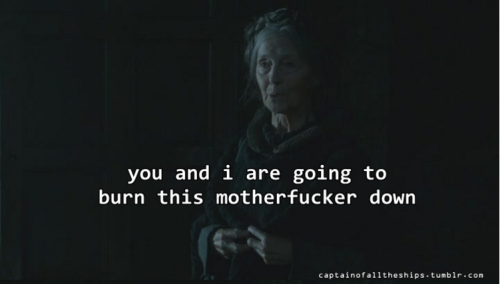
Real talk: WHERE IS THIS ELUSIVE KENNEL MASTER?
Some indeterminate amount of time later, Theon spots Sansa walking through the courtyard and lowers his head. Looking on, Ramsay and Batfinger chat about how lovely Sansa is. Ramsay says he’ll never hurt her, and Batfinger is like, “well damn if I bothered to do background research on you so let’s hope so.” Then Ramsay sounds embarrassed about his only recent lordship and graciously leaves when Roose approaches. Batfinger assures Roose that Sansa is a virgin and therefore “by law of the land, no man’s wife” (?????). Roose then is like, “should we really do this?” and Batfinger is all, “whatever, Queen Margaery is the actual queen. ‘Queen Mother’ means diddly squat.” But then Roose is all, “then why are you getting letters from Carol still?”
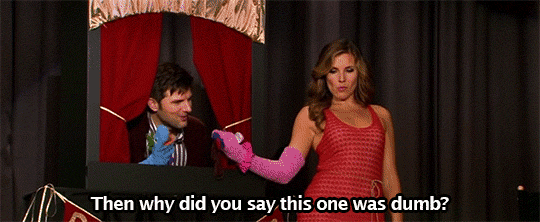
Because apparently Roose doesn’t understand how politics work. Or realize that they both have derived power from the same House. “The Lannisters made you one of the great Lords of Westeros. Yet here you are in the North undermining them.” Um. Hold up a mirror and repeat that, Roosey. How is this even a conversation? D&D must think the audience is that stupid, or perhaps need to go through a circular argument of contorted logic to make it sound like this makes sense for their own sakes. Which btw, the answer for both Littlefinger and Roose was like, “eh, the Lannisters probably won’t bother, so let’s go for it.”
Still, Batfinger apparently found the letter from Carol to be so important that he has to go back down to King’s Landing because “we don’t want her to be suspicious.” Here’s the thing: didn’t both he and Roose just decide “we’re totally fine thumbing our noses at the Lannisters and the Crown because the North is soooo far away”? Like seriously four seconds ago! In the same scene! Now suddenly Carol’s suspicions matter??!?
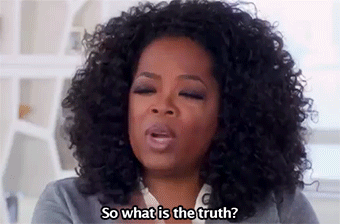
Batfinger has to break the news to Sansa, and he finds her in the crypts where she’s lighting candles like her dad used to. Batfinger vomits exposition all over her that has nothing to do with either of their arcs. Then they walk away from Lyanna’s statue so we know “oh now the exposition scene is done, and we’re heading into a plot scene.”
Batfinger says he’s riding to King’s Landing. Sansa gets upset and doesn’t want to be left in Winterhell, but Batfinger assures her it “won’t be long” because Stannis will march on Winterhell to get the Northern Lords. Who don’t exist. Poor Stannis, he didn’t even try to swing by the Umbers’ house and see if they were interested in toilet papering Winterhell?
Batfinger thinks Stannis will win (…) and name Sansa Wardeness of the North because she’s the “only surviving Stark” (by the way, if anyone remembers, Batfinger told Sansa that Arya was still alive back in Season 4. But it’s okay if you don’t because Sansa forgot too. And possibly Brienne). Why she needs to be physically in Winterhell to wait for Stannis is anyone’s guess. Apparently the safest place to be is the castle that might be under siege, allying yourself with your enemies.
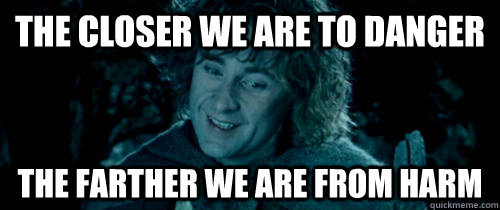
Sansa wants to know what will happen if Stannis loses. Batfinger tells her Plan B: “make Ramsay yours.” Because I guess…solidifying the claim of the family who murdered her own is “revenge.” Sansa says she doesn’t know how, but Batfinger assures her she does. They kiss (it seems earnest) and she flirtatiously remarks how she’ll be a married woman when he gets back. Which in another context seems like “then we can fuck.” Or maybe it’s in this context. She’s really not creeped out by him at all?
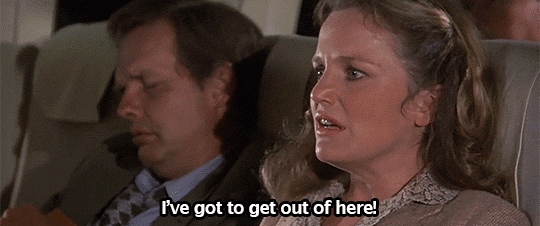
Oh, in case you were worried, Brienne and Pod made their way to Winterhell (around Moat Cailin…) and set up in an inn that overlooks the castle. A random old man comes in and Brienne asks him how he likes the Starks. Then she tells him Sansa is in the castle and she needs a message delivered because she swore an oath to Cat (that’s not a risk). The old man points out, “her mother’s dead.” “That doesn’t release me from an oath,” Brienne answers, hoping that she won’t be made to forget those words by the writers in a few episodes.
With Batfinger flying into the night, we’re left with the Boltons to take center stage in Winterhell. And boy, do they. We are treated to a scene between Ramsay and Myranda. At first it starts out as a fairly typical scene with a jealous girlfriend, like one we might see in a rom-com. Myranda is out of bed, upset about his marriage, because Ramsay promised to marry her before he was legitimized. She asks if he thinks Sansa was pretty, which he says “of course I do.”
However, things take a turn. When Myranda keeps her back to him, he climbs out of bed and grabs her from behind and pulls her towards him. We see her try and fight against it and look uncomfortable. Ramsay says he’ll make time for her, but she says “perhaps I’ll marry too.” He mocks her, and she either tries to hit him or push away from him (I can’t tell), but he stops her and pins her against the wall as she struggles.
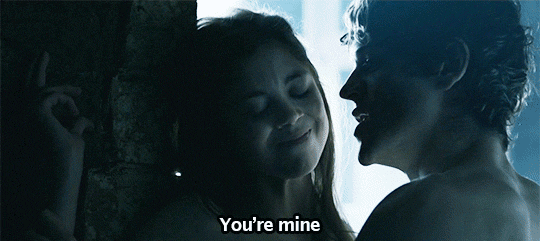
He tells her she is his and isn’t going anywhere, unless she keeps “boring him” with her jealousy, because… “you remember what happens to people who bore me.” Myranda looks incredibly upset for a moment, but then kisses and bites him, which apparently excites him. He then flips her, and has sex with her from behind as she grimaces.
I’m really sorry for the tonal shift when describing this scene, but it’s going to be an important point later. Myranda is clearly Ramsay’s “side-kick.” And not a very good person. But this scene also makes it clear that she is being abused. That she is just the kennel-master’s daughter, with no recourse and no way out of this relationship. I can’t begin to guess what this D&D were going for with this scene, but all that’s clear to me is that the propping up of Myranda as the antagonist who “got hers” is truly a disquieting narrative.
Meanwhile, Sansa is passing her time by sitting and staring at nothing. Too bad she gave up sewing in her moment of empowerment. Oh well, it’s not like most pre-industrial societies have a taboo against idleness or anything!
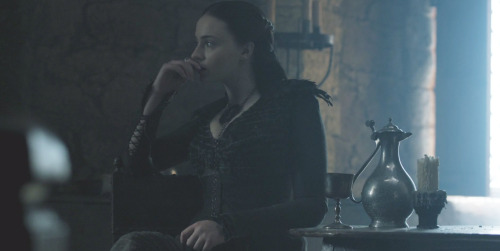
Then the North Remembers lady comes in under the guise of refilling the wash basin. She tells Sansa to light a candle in the tallest tower if she’s in trouble because she has friends in the North. Then she leaves. Hope no one was actually checking on that bucket of water.
Sansa decides to go check out the tower (probably because she’s bored) when she’s approached by Myranda, who compliments her dress. When Sansa’s like “who are you?” she says she’s the kennel master’s daughter. Then she grabs Sansa’s arm and is like, “this is cool…good thing your mom taught you…moms are nice…remembering is nice.”
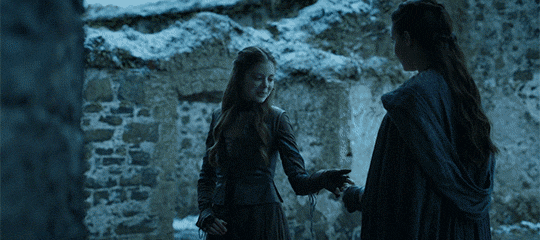
And apparently Sansa is so enamored with this exchange that she agrees to walk into the back of some creepy-ass kennel because Myranda says she has a “surprise” that will “help her remember” even more.
The surprise is a Theon-shaped lump, but it’s so fucking dark on my screen that I can’t really tell you much beyond that. Theon read A Dance with Dragons and points out that Sansa “shouldn’t be there.”

I guess he thinks Ramsay is a book snob too, because the next scene he tells him that he ran into Sansa. It seems like Ramsay is going to punish him, but instead he is just like “I forgive you.” It was tense, and it does show that Theon is quite broken and “Reek.” Credit where credit is due.
However that credit is going to quickly disappear. We transition to an awkward family dinner with Roose, Walda, Ramsay, and Sansa. I guess Myranda’s “moms are nice” sentiment rubbed off because Sansa decided to change into Cat’s clothes. Ramsay stands and makes a gracious toast. Sansa rolls her eyes and refuses to drink. Her plans to “make him hers” are awfully similar to how I go about ignoring unsolicited conversations at bars. Walda tries to be nice and say how it must be difficult for Sansa to be in a strange place, which Sansa comments it’s the people who are strange. She’s clearly annoyed with the entire arrangement.
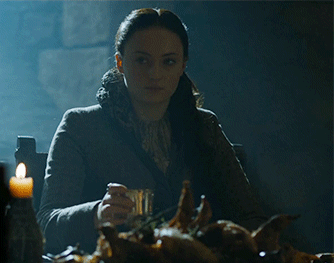
Then Ramsay decides to bring out Theon. He forces him to apologize for killing Bran and Rickon. Sansa starts to cry. At some point in there Ramsay tells her “The North Remembers” and that’s why he punished Theon and turned him into Reek, even saying “he’s not Theon anymore.” Then 5 seconds later he has Theon apologize for Theon’s crimes. Do I need to point out how that “credit” from last scene just disappeared?
Sansa is clearly upset with Ramsay. Then Roose decides to just randomly announce that Walda is pregnant with probably a boy. Because if there’s one way to keep your son with a history of violence and suspicious murders in his place, it’s giving him another target.
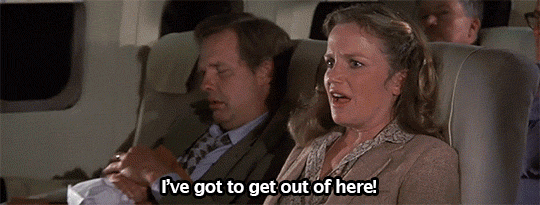
The scene then transitions to just Roose and Ramsay sitting alone. Ramsay makes fat jokes about Walda, and Roose tells him to knock it off. Then he tells him the “how I met your mother” story, which was that he raped her and she fought him the whole time. But then later he looked at [baby?] Ramsay he realized, “you are my son.” The music swells as Roose concludes, “therefore I need your help defeating Stannis.” I really have no idea how any of these points made sense together or what that has to do with Ramsay antagonizing Sansa, but okay.
Meanwhile, in King’s Landing, Batfinger finally sat down with Carol. Now remember Carol’s summons are the reason he had to leave Sansa alone in Winterhell. Carol’s summons. Which we know, because we saw Carol ask Qyburn to send the letter. Very urgently. Look, Weisseroff is smaller than Westeros. But. To summon someone from a great distance, say, The Eyrie to King’s Landing, you really need to have a reason. Especially if you’re summoning someone you wanted to be watching over an entire one of your kingdoms?
Here’s what Carol wanted, and I directly quote: “If war comes to Westeros, will the Knights of the Vale fight for their king?”
Batfinger assures her yes. Then she says, “Good. If there’s nothing else…”
SUMMONS? Really, Carol???
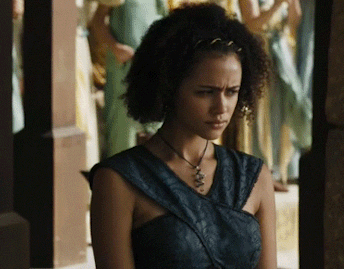
I guess good thing for Batfinger that he was called down there, because he has something that he couldn’t trust in a raven. Remember those ravens he was sending to Bolton, who was expressly in bed with the Lannisters, saying “I have undesirable #1 want to marry her”???
What he tells her is: the Boltons are marrying Sansa to their recently legitimized bastard. Okay…Ramsay’s legitimacy comes from Tommen. Why wasn’t Carol’s first step to take that away again? Reasons. Maybe that’s not a thing that can happen. Whatever. In Weisseroff marriages can just be thrown aside because of a lack of consummation, so I don’t expect these laws to make sense.
Carol is noticeably upset but has no troops she can think to send because Larry’s in Porne and Kevan is uncourageous (so if Larry had been around she would have dispatched troops to Winterhell? Wasn’t the Batfinger/Roosey B alliance based on the assumption “eh they won’t come North”). Batfinger offers to take care of the situation with his Vale Knights if he can be named Warden of the North. Cersei agrees only if he gives her Sansa’s head. He’s like “on it.”
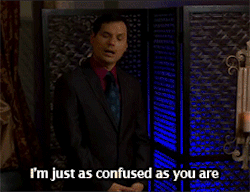
Back at Winterhell, the wedding approaches. Myranda draws a bath for Sansa to wash out her hair dye. She then proceeds to tell Sansa about all the women that Ramsay murdered, and implies that she’s seen the bodies after they’ve been fed to her father’s dogs. Sansa realizes that this is indicative of Myranda’s love for Ramsay (??) and therefore is trying to scare her off of the marriage. She says “I am Sansa Stark of Winterfell. This is my home and you can’t frighten me.” Hey, this isn’t cheap emotional manipulation of the audience, right?
Next we see Sansa in her lumpy, high collared wedding dress. Theon comes to fetch her from her room. He asks her to take his arm or else he’ll be tortured. She looks at him, goes IDGAF, puts on sunglasses and sashays out the door. Well, I mean…in essence.
Then it’s the wedding. There’s creepy ass candles everywhere.

And potentially a sith lord?
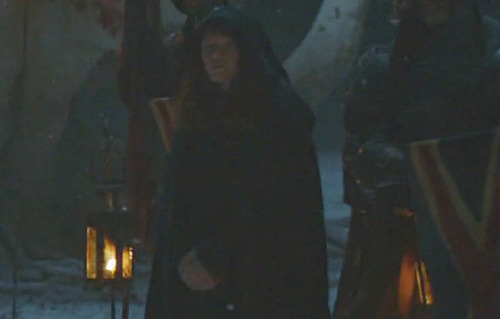
Myranda stands in a very revealing dress looking really sad with her boobs looking like they’re going to have frost-bite (no Madonna-Whore complex, right?).
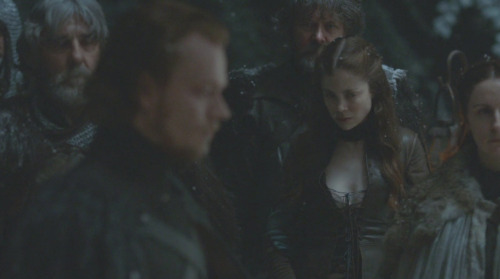
Ramsay and Sansa exchange their Northern vows with a ceremony that very closely mirrors the one Martin wrote about in ADWD. [It’s easily the best part of the episode. Weird.]
Aaaand then it’s *the* scene. I mean. Don’t make me do this.
OKAY well first Ramsay asks why she’s a virgin, and Sansa says that Tyrion was “gentle.” He’s like “you’re not lying right?” And she assures him she’s not. Then he orders her to take off her clothes, and Theon starts to leave. Ramsay orders him to stay, while also telling Sansa to undress; he hates asking a second time. Then he says to Theon, “You’ve known Sansa since she was a girl. Now watch her become a woman.”
Then Ramsay rapes Sansa. The camera focuses on a crying Theon, but we hear her sobs. I down a bottle of Basil Hayden’s. What great television.
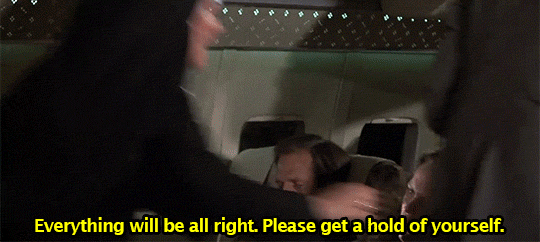
Let’s cleanse our palettes. I should mention that at this point, Stannis is en route to Winterhell, so we can start talking about him. Our first shot of the camp is like, a couple of soldiers coughing, and a few more huddled under blankets. Davos pops into Stannis’s tent (Mel’s there already) and tells him 40 horses died in the night, they’re low on food (pst…eat the horses), supply lines are cut off from the snow, and the Stormcrows left in the night. He wants to go back but Stannis insists that “this is the right time and I will risk everything because otherwise, I’ve lost.” Davos seems to disagree, but just leaves the tent.
Stannis asks Mel if she’s sure about her visions. She tells him she has seen herself walk along the battlements of Winterfell and the flayed man banners lowered to the ground. As she tells him this, she bends over a map and he ogles her ass. He tries to kiss her but she says, “sometimes sacrifices must be made.”
She talks about the power of a king’s blood and implies that he needs to burn Shireen. “Get out,” he replies quietly and with mild annoyance, as if Mel had suggested bringing strawberries to the company picnic and forgot that he had an allergy.
Oh god, I have to go back to Winterhell-proper, don’t I?
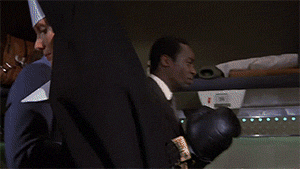
First we see Theon in Sansa’s room like, shutting a window because she’s cold or something. She is covered in bruises, wearing a small nighty, and has artistically tousled hair. She asks him to stay and help her, and tells him that Ramsay hurts her every single night. She then yells about how Theon betrayed her family. He apologizes, and she begs him to help by lighting a candle in the broken tower. She reminds him that he is Theon, the last surviving son of Balon. Ramsay had just reminded him of that over that awkward dinner too! I’m sorry, it’s just that I feel Theon’s transition back towards self-understanding after living as Reek was horribly random on the show.
But the plot needs him to be Reek here, because he runs up a bunch of stairs to tell Ramsay about the Brienne bat-signal. Which we know she’s tending to because we get a 10-second shot of her staring at it, no dialogue.

Later, Sansa Bolton goes for a walk with her husband, where he tells her about Stannis approaching with an army. Then he just randomly is like, “one day I’ll be Warden of the North.” She points out he’s just a bastard who’s been legitimized by another bastard and he should be worried about Walda’s child. Ramsay is visibly upset, but then leads Sansa over to a tree or something where he’s hung the body of the North Remembers Lady. Her entire body is flayed except her face because apparently her heart gave out. He then tells her “Reek says you want to leave,” kisses her on the cheek, and orders her to be escorted back to her room.
Oh yeah, she stole an auger-type thing during this scene too. For…lockpicking.
There’s another scene in King’s Landing where Batfinger throws Carol under the bus because he thinks Lady Olenna is a cooler friend. I only mention this because I guess he doesn’t care that much about the Warden of the North? Why was he even still there?
Our next scene at Winterhell…
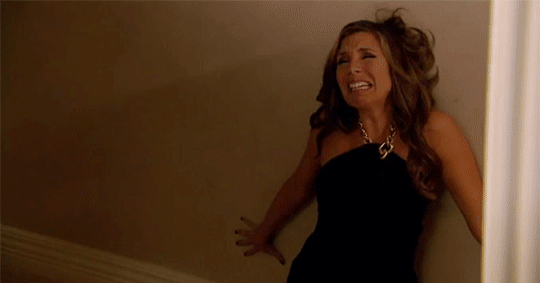
Features Sansa Bolton and Theon again. This time she’s PISSED. She asks Theon why he told Ramsay. Theon insists that there is no Theon and that there’s only Reek because Theon was tortured away. Sansa Bolton says “good” and that she would have done the same. Theon responds “I deserve to be Reek” and proceeds to list his crimes as Theon (though saying “I did terrible things”). He mentions “those two boys” and Sansa screams at him and he screams back and then it’s revealed he didn’t kill Bran and Rickon! And no one is listening in I guess! (They just shove her in a locked room and hope for the best?) And we can’t really tell if Sansa gives a shit about two other boys because Theon runs away going “I’m Reek!”
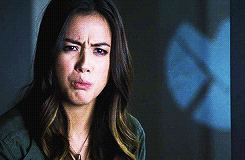
At the same time, Roose is telling Ramsay about Stannis’s army of “no more than 6,000” (guess they don’t know about the Stormcrows?) and that they can withstand a siege of 6 months and there’s no way Stannis can last that long with the storms and winter coming. Ramsay says he wants to “hit hard and leave a feast for the crows.”
Roose explains that the snows are too deep for an army, but Ramsay replies that he only needs “20 good men.”
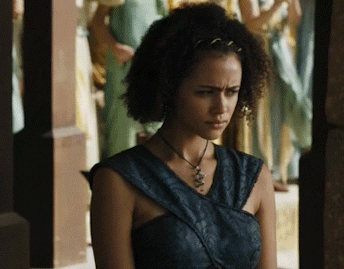
And boy were they good men. Next thing we know, Meli-sans-bra runs out of her tent because of something she saw in her fires, and we’re treated to shots of tents BURSTING into flames. By the way, it is a freezing night, and the tents are covered in wet snow. And yet, instant immolation.
The next morning Davos informs us that Ramsay Sue and his 20 Good Men did the following:
- Destroyed all provisions and somehow only provisions. Guess they had night-vision goggles
- Broke the siege weapons. In the dead of night. Without waking anybody. Did these siege weapons have like, a secret pin where if you pull it out it will just collapse?
- Killed hundreds of horses (and set others free)
Davos wants to retreat but Stannis says no. Laterish, Stannis sends Davos to go back to Castle Black to get Jon’s help. Davos wants to take Selyse or Shireen with him but Stannis says no. He then goes to say goodbye to Shireen (it’s largely implied he knows something bad is going to happen to her) and gives her a wooden stag. He thanks her for being his reading tutor and kisses her on her head before leaving.
Later, Stannis (gonna start calling him “Satannis” now because he turned the ledge) seeks his daughter out. They talk about books, and Shireen comments how it’s the choosing sides in wars that make everyone awful. Satannis expresses that he has to choose but he’s torn. Shireen comforts him despite not knowing what he’s talking about and says that if she can help him in any way, she’d like to. Then she hugs him.
Then she’s led out to the pyre while still holding the wooden toy stag and they fucking burn her to death. Her mother breaks down and tries to stop it, later falling to the ground in despair, while Satannis looks on with an expression someone might wear while holding in a fart.
You know what, D&D…

The next day, we learn that burning your own child is not so popular with the sellsword vote. They all left and took all the horses. Who are these other men that are fine with this though? Apparently half his force. Then someone comes to Satannis with more bad news. “Speak up,” he replies, “Can’t be worse than mutiny.” LOL it is, his wife killed herself. What a good punchline. And oh yeah, Lady Meli-sans-bra was spotted riding out of camp with the ONE horse the sellswords left. But whatever, they’re marching.
And I guess they were only like, 80 feet from Winterhell (WHY did they burn Shireen) because Pod spots them soon after and runs to tell Brienne that Satannis’s army is approaching.
Meanwhile, inside the walls of Winterhell, Sansa lockpicks her way out of her room with the auger/beer tap thing and goes up to the broken tower where she lights a tiny candle. Would you believe it, but at the exact same time Brienne decides to ditch her post and go hunt down Satannis, because rushing into a battle makes sense.

Out on the field…thing, Satannis orders the digging of trenches for a siege (??? the man has no supplies and half his forces missing, HOW would a siege work?), but is informed “there’s not going to be a siege,” because over ridge comes an entire mounted army of Bolton forces. Sansa looks on from her tower. We hear a soldier shout “we’ve got no chance” in Satannis’s line. He goes to engage them anyway.
Somehow the next scene is a living Satannis in a wooded area (I guess he tried to partially flee?). He kills a couple of Bolton spares, but is injured and collapses beneath a tree. Brienne finds him and says she was kingsguard to Renly. She sentences Satannis to die in his brother’s name. Satannis says “do your duty.” The camera cuts away, but his beheading is strongly implied (and has since been confirmed by those who work on the show…this isn’t that executionary slicing into a pumpkin in Prisoner of Azkaban).
We then cut to the battlefield where we see Ramsay surrounded by corpses. A half dead soldier shouts “I surrender.” Ramsay says that he accepts but kills him anyway.
Back inside the walls, Sansa runs into Myranda and Theon. Myranda has a drawn bow pointed at her. Sansa says she’d rather die than go back to her room. Myranda taunts her saying that Ramsay needs her alive, at least until she gives him heirs, but then he has incredible plans for “those parts.” It seems as though she is going to non-fatally injure Sansa. Before she can do anything, however, Theon tosses her over the railing where she falls to her death. They see the gates open and that Ramsay is coming back. Theon grabs Sansa, runs up more stairs, and together, they jump off a ridiculously high wall into a ridiculously low snow pile while holding hands.
Annnnnnnnd. That’s it! That’s Winterhell!

To the question of “what story were they trying to tell,” the only “story”…the only “narrative” that occurs within the walls of Winterfell is the story of how Sansa was raped and brutalized by Ramsay, and then used that victimization to help Theon reconnect with himself and save her. There is very mildly the story about Ramsay being worried about his security as Roose’s heir and trying to impress/make his father proud. Outside the walls, there’s the story of Brienne trying to fulfill her oath to Lady Cat by helping Sansa, only to abandon it for the sake of revenge. Finally, there is the story of Stannis’s farcical defeat: a man becomes so blinded by his “ambition” that he burns his daughter alive, and then faces the consequences of everyone abandoning him as a result, followed by a humiliating defeat.
It also seems to be the story of passive, victimized women, and active men. With Brienne as kind of an exception, but given that she abandons Sansa in her time of need, it’s hard to argue that her moment of action is treated favorably by the narrative.
Still, let’s try to go deeper here.
Whose story was it?
I think it is fair to say that these are the following candidates for the story’s leading character:
- Brienne
- Littlefinger
- Roose
- Myranda
- Stannis
- Sansa
- Theon
- Ramsay
I think it’s blindingly obvious that it’s not Brienne. She sat on the sidelines, and though her execution of Stannis was proactive, it’s hardly enough to consider her “leading.” She’s support.
Littlefinger was escorted off-scene as quickly as possible. He arranged the pieces, but did not follow through on them. He may be the “leading character” to a later scheme, but in terms of Winterhell, he merely contributed to the set-up, not the climax of the story.
Same with Roose. He was certainly a factor in allowing the circumstances to come to pass, but he mostly served to provide Ramsay with motivation for his actions.
While Myranda definitely got a lot of screen-time considering her invented role, it’s hard to call her the “central” character. She acted in accordance with what she believed were Ramsay’s wishes most of the time, and only sometimes out of her own jealousy.
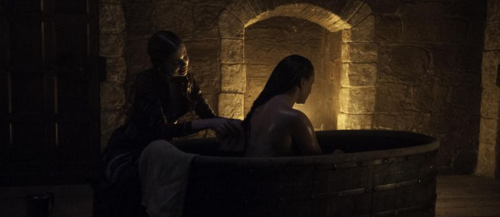
Stannis is a difficult case because his campaign is, in many ways, quite disconnected from the Winterhell “proper” storyline. I mean, his approaching arrival actually affects nothing internally. Because the internal “tension” of this plotline seems to be: “how shitty can Sansa feel, and will Theon ever help her?” As Roose explains, Stannis doesn’t matter. They have provisions for 6 months and they’ll out last him by doing nothing. So while Stannis may be a central character to some kind of weird, cautionary tale about ambition, it seems a large stretch to call him the protagonist of Winterhell.
That leaves us with Sansa, Theon, and Ramsay. Sansa is an obvious choice. After all, she’s a “fan favorite,” and it’s clear that we are supposed to be horrified by her treatment and rooting for to get out of the situation. We were also told by writer Bryan Cogman that Sansa is a “hardened woman making a choice,” so it’s implied that we’re not supposed to be viewing her as a hapless victim. However, while the story within Winterhell very much revolves around her brutalization, she serves entirely as an object, spurring others to act. The only proactive thing she does is light a candle, which was never meant to work. She tries to convince Theon to help her on a number of occasions, but she herself remains passive.
Theon, therefore seems like the best choice for the central character. After all, the story in Winterhell is kind of based on his ADWD chapters…if you squint. While inebriated. After receiving a blow to the head.
Still, in many ways, the story could be summed up by “Theon sees Ramsay’s bride suffer, reconnects with self, saves her.” There’s also no denying that he was quite proactive, especially in the final episode where he killed Myranda to save Sansa, and then spirited her to rescue.

However, if we pick Theon as the central character, then there’s a lot of scenes that not only don’t include him, but have tensions he is totally untouched by, that we’d have to justify.
For instance, every scene between Ramsay and his father. What purpose do these serve? Why was so much time spent fleshing out this relationship. When the music swelled after Roose’s “help me defeat Stannis” pump-up speech, were we supposed to be rooting for them? What about Ramsay’s insecurity over his bastardy, and learning about Walda’s child? I know this was dropped quickly within this season, but we’re talking about a plot-point addressed in three scenes (none of which contained Theon). Not to mention Theon looking nervous with a pitcher of water while Roose compliments Ramsay on his handling of the Cerwyns is hardly a scene that focuses on Theon. In fact, Theon’s presence in the room was entirely expendable.
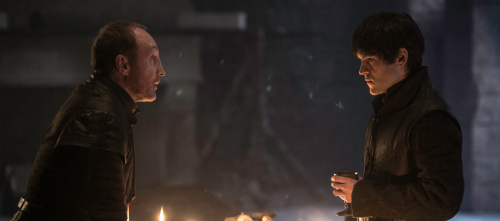
And then, of course, there’s also the Myranda/Ramsay/Sansa…love triangle? I mean, there were completely unintentional implications of this narrative in the scene between Ramsay and Myranda (where it’s clear Ramsay is abusing Myranda and forcing her into a relationship), but I do believe that it was a scene intended to provide depth of character, however misaimed. Ramsay kind of did get stuck with a political marriage, as he pointed out to his former would-be wife (apparently).
Also, if we’re supposed to be tracking Theon’s transition from “Reek” to “Theon” (in other words, a healing arc of sorts) as we would if Theon was the central character, then it’s hard to explain the complete inconsistencies of that. He seems to be “Reek” or “Theon” when the plot demands that he is. For instance, Ramsay wants him to apologize to Sansa for killing his brothers–Theon’s crimes. And it’s clear that this apology is hurting Theon to deliver, but it’s breaking the whole “you’re not Theon” thing going on. Then after Sansa is raped, he goes back to being Reek to prevent her rescue and extend this plotline of awful. Later, he says “I’m Reek, there is no Theon” and then follows it with “I deserve to be Reek” (because of Theon’s crimes).
Look, it is always going to be difficult to script someone who has been tortured to the point where they’re policing their own thoughts as they struggle to maintain a [forced] identity, and then the slow process of them coming out of that mindset and recognizing themselves once more. And of course it doesn’t necessarily have to be linear. But there has to be some kind of consistency. And the erratic way that Theon’s mental state was treated this season really just serves to highlight how his character acted in ways that only served other characters. Or rather character: Ramsay.
Ramsay is the central character of Winterhell. He was the top point of a love triangle, dealt with his daddy issues, stopped his wife’s attempts to escape, led a stealth mission to severely handicap the army threatening his home, and then led the charge into battle where he triumphed. He was awarded the most agency by the plot, and every other character supported his story.
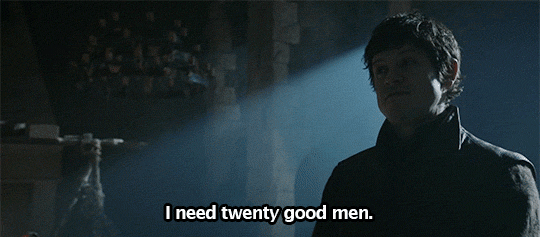
What was the result of this story, from a thematic and character perspective?
Given that Ramsay is the central character, the theme explored most intimately is that of a son trying to please his father to secure both his political and personal birthright as a worthy Bolton heir. The first scene we are treated to with Ramsay is where he and his father discuss his dealings with Northern Lords, and how Ramsay’s political marriage is crucial to their continued success in Winterhell. The last scene we get with Ramsay shows the fruits of his “20 Good Men” plan; he soundly defeated his enemies, as he promised his father he would, and is ready to ride back home, the victor.
We could argue that the love triangle might be a bigger focal point, but the fact is, it is all contextualized by the political necessity of his match with Sansa. In his scene with Myranda, he makes a point to hammer this home.
If you don’t accept the premise that Ramsay is the central character, perhaps this can convince you: explain to me the thematic significance of anyone else’s arc within Winterhell. We can pretend it’s a theme of identity and atonement for Theon: Sansa’s continual presence reminds him of the ghosts of his past and his “original great sin” of betraying the Starks, which allows him the clarity he needs to rescue Sansa from her horrors.
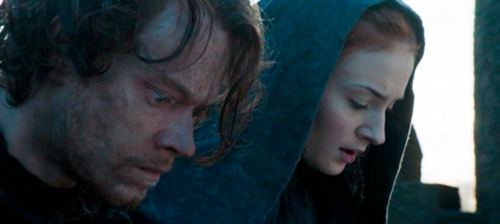
And it’s true that D&D seemed to focus on the importance of Theon saving a Stark for his “redemption.” But given the inconsistency of Theon’s mental state, as I detailed above, this is an awfully generous claim to make. Because again, it wasn’t that it was an attempted, but ultimately failed depiction of someone overcoming major mental trauma: it was literally that Theon’s self-awareness and presence in any given scene was dictated by the needs of Ramsay’s arc.
Ramsay needed Theon to apologize for killing Bran and Rickon at the dinner scene (aka owning up to “Theon’s” crimes rather than the self-policing “I’m Reek” mentality) so that he could stick it to Sansa and also say his hilarious “That was getting very tense” line. Theon needed to be back in full “Reek”-mode to stop Sansa from escaping in “The Gift” so that Ramsay could assert his dominance over her yet again.
And as I said, I don’t mean to imply that mental recovery is necessarily linear, but given that Theon’s breaking point seemed to occur off-screen, it’s an incredibly difficult claim to make that this was in any way prioritized of Ramsay’s father/son relationship or his wacky antics. Especially given that there was an entire love-triangle separate from Theon to service this.
So I wouldn’t say Theon’s reconnection with his sense of self, ending in a decided rejection of the choice he made earlier (saving a Stark now versus betraying a Stark) was so much a central theme to Winterhell, as a plot consequence by necessity of needing the season to end with him and Sansa jumping off that wall.
What was the thematic significance of Sansa’s arc? The only possibility I can think is that she needed to learn how her skills–the skills that awarded her a degree of agency at the end of the Season 4–were absolutely unqualified to go up against the likes of “real men” such as Ramsay. Because why else have her assert herself three times (four, if you count objecting to the marriage arrangement to Littlefinger only to be talked out of it for no reason), only immediately to have the rug pulled out from under her?
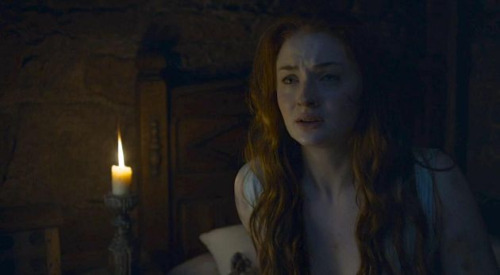
Or was the thematic climax of her arc supposed to be when she boldly asserted, “If I’m going to die, let it happen while there’s still some of me left.” That it is better to die early than allow yourself to become deadened by abuse. But if that was supposed to be the take-away from her arc, even ignoring how fucking awful that is just on a basic narrative level, why is it that she was asserting her large desire to live in the two moments that sandwiched it (Lighting the candle and jumping off the wall, in a moment that Weiss described as her “finding the strength to keep on keepin’ on”)?
Really both of these options are just so horrid, that I prefer to assume D&D gave no thought to Sansa’s arc, and moved her randomly to Winterhell for the benefit of Ramsay’s storyline. You know it’s a great adaptation when that is the kindest choice.
I think it’s nearly impossible to look at Roose’s own character arc this season, as it is obviously intertwined with Ramsay’s. Other than his once scene with Littlefinger, Roose’s entire existence this year was centered around his son–either providing praise or admonishment depending on the situation. He may have been the one to arrange the marriage, but we see absolutely nothing proactive on his part during the events of Season. Roose exists simple to react to Ramsay.
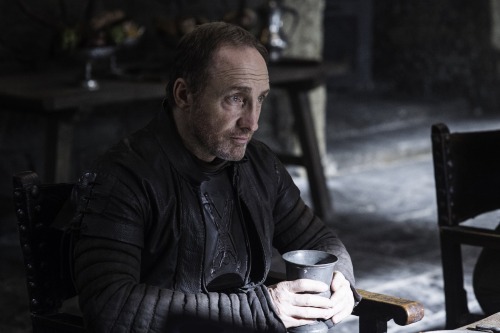
Let’s finish out those within the confines of Winterhell. Is there any sort of thematic significance in Myranda’s arc? Here, we have woman who is shown to us as being in love with her abuser.
Myranda spends all season trying to fuck with Sansa out of jealousy, while also keeping her “in her place.” Then she is killed. The most that could be said is that it’s a cautionary tale about letting jealousy blind you. But given how her relationship with Ramsay was painted to us as violent and coercive, it seems like an odd character to punish. I guess if we want to pretend that D&D understood that they essentially scripted a “battered wife” then her arc is about her desperate attempt to avoid further abuses and keep Ramsay’s favorable attention. But given the way that she is shown to simply be outright petty and sadistic towards Sansa (when Ramsay is not around, also), that’s an incredibly difficult claim to make.
It seems likely D&D didn’t even understand that this was a dynamic they introduced. If that’s the case, I’d guess that in their minds, “battered wives” are women more akin to Sansa in terms of what they experience and how they react, and a woman “like” Myranda can’t be thought of as a victim–unfortunately a mindset that is not uncommon.
So if they really did just fundamentally misunderstand what they wrote, then what the hell was the purpose of her as Ramsay’s sexy, evil side-kick (and what was the point of her scene with Ramsay in particular)?
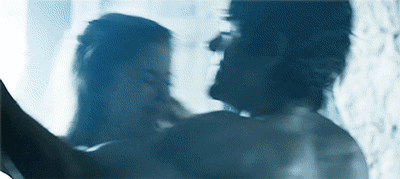
Again, I have to assume that she only existed to provide “depth” to Ramsay’s character, and perhaps to give us a “shock” in the finale. Or make it clear that Theon is finally “healed.” Because a broken body of a woman should always contextualize that.
Given that we’re looking at the result of this story from a thematic perspective, it seems incredibly difficult to draw any sort of meaning from the arcs outside the walls of Winterhell. I mean, clearly Stannis was the “biggest” actor, but it seemed like the entire purpose of his campaign was to bring his decisive end. It was as if they needed to get rid of a plotline, and this was the most efficient way to do it. If we want to pretend there was any thought given to this, or any sort of significance, we could say his is a cautionary tale about ambition. But given the way it required random character 180s and plot contrivances (20 good men) to make it happen, it just seems more like chess pieces D&D wanted to sweep off the table to make room for others.
Therefore, the other character arcs intertwined with Stannis’s campaign were just as devoid of meaning. Davos opposed him all season but grudgingly carried out orders, ultimately to leave Shireen to her grisly fate (with the implication that he strongly suspected it). What’s that arc? “The cost of loyalty”? Shireen is simply a victim who did nothing wrong and needed to be lit on fire to further the story. Is Mel’s arc “the cost of faith”? Is Selyse’s “the cost of being a shitty mom”?
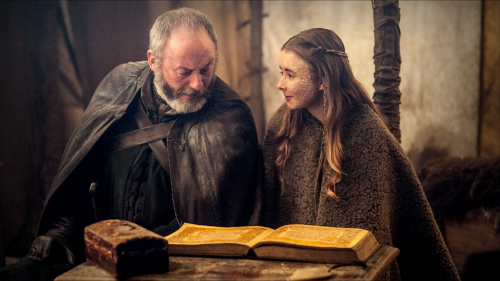
It’s an exercise in futility to parse any sort of significance out of this, to be honest. Ramsay was the star of Winterhell, and that required Stannis’s implosion. The other characters just behaved in totally random ways to see this though.
BUT THAT REMINDS ME. I need to point this out because it’s so damn poorly seeded. Mel has a quote to Stannis in the tent when he’s like, “idk about burning my daughter.” She says:
“I have seen myself walk along the battlements of Winterfell. I have seen the flayed man banners lowered to the ground.”
Remember this line, because critics are later going to be praising it when it comes to fruition next season as being so clever. It’s not clever. It’s clumsy. I guess we could argue that this is all about the dangers of believing because it’s always open to misinterpretation, but is it even worth pointing out how Book!Mel is quite aware of this tension? Sure. Meli-sans-bra is willing to trust in her leech magic that only has a 66% success rate to make a march to war easier. Because she had to. Because D&D decided that Stannis had to burn Shireen to get all his army to leave so that he could be cleanly picked off.
Oh shit, I’m sorry, I forgot about Brienne. And Littlefinger. I think we can agree that Littlefinger was sidelined as soon as possible to make way for Sansa’s brutalization, right? I mean, his “summons” by Carol was the most obvious plot contrivance given that she had nothing to talk to him about. They just needed him out of Winterhell. Is there any point in trying to rationalize why he threw Carol under the bus 4 seconds after getting her permission to invade Winterhell? Or whether or not the Lannisters actually could intervene in the North, when both Roose and Littlefinger assumed no to set up the marriage, or how arresting Carol even helps the Tyrells?
Meaningless.
And little more can be said about Brienne’s arc. They needed her to follow Sansa into Winterhell because D&D were holding the riverlands plotline for reasons still unexplained. Then they thought she’d be a more interesting choice to lop off Stannis’s head, and shoe-horn in the theme of “revenge.”
And of course she had to make that decision just as Sansa lit the world’s brightest candle. We can pretend it’s another cautionary tale, this time about vengeance. That’s what they were going for with Porne, right? And potentially Arya’s arc? But like, again, for a theme to actually have narrative significance, it needs to be the result of more than just random character actions. Down in Porne, Faullaria decided to make it her mission to kill Myrcella for no reason, even after getting chastised by Doran, especially when Larry was a more logical target. With Arya, D&D bent over backwards so we’d get that Trant was really asking to be killed, lest there be moral ambiguity.
So no, there was no significance in Brienne pulling a character 180, ditching her vows, and beheading Satannis. She was a well-positioned sword, nothing more. The chips are going to reset to next season.
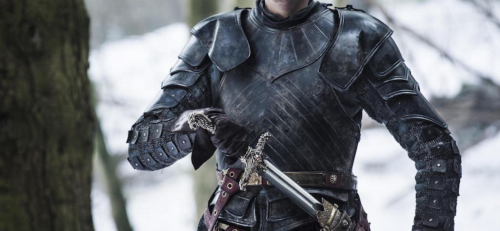
The only character D&D gave a moment’s thought to was Ramsay. Let that sink in.
I’m sorry, it’s just that after writing this section, I’m realizing that this plotline is so much worse than I thought. Porne was clearly offensive and racially exploitative, but it at least had that consistent “love conquers all” and “Larry embraces fatherhood” narrative going through it. Winterhell was just utterly devoid of meaning, except that we were supposed to see that Ramsay is a totally awesome character who is not to be fucked with and who is able to overcome everything thrown at him. Everything else just made no sense. It was like D&D knew certain things had to happen (Shireen burning, Sansa getting raped, Theon and Sansa leaping off a wall) and then just had all the characters behave in these arbitrary ways with no internal logic so that they could check those plot points off.
What adaptational choices were made?
I’m sitting here just flummoxed. Because what did they adapt?
No seriously. Ramsay gets a wife to rape. Adapted. Everything else? Not. I mean, I wrote a more coherent post on this once if you don’t believe me.
I guess we have to look at the other characters too. Nothing about Brienne’s arc resembled what she did in AFFC. I mean, she was “looking for Lady Sansa” in both, if we want to be super generous. But like…that lasted what? One scene for her? She just randomly runs across her in the inn.
Littlefinger absolutely didn’t do anything resembling his arc. I mean, instead of navigating Vale Politics, he drops Robin like he’s hot, comes up with a shitty plan that even a disinterested partner of a show-only watcher could tell you makes no sense, and then high-tails out of there to not deal with the ramifications. And hopefully it’s blindingly clear that arranging a marriage between Harry the Heir and Sansa is not at all similar than having her marry into the family that slaughtered her own? Because you don’t get revenge on someone by MARRYING THEM AND GIVING THEM HEIRS!!! Like yeah, from what we can tell, Harry’s a bit of a pompous asshole. But given how wildly different the contexts are, especially for Sansa’s reason in going along with it, is that even an apt comparison to draw?
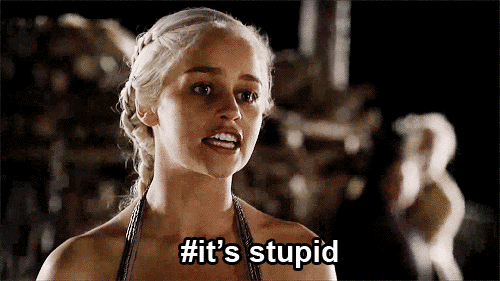
That brings us to Stannis, Davos, and Mel. Instead of Davos actually getting his own arc, he just like…provided a voice of reason for Stannis to reject over and over again, but then never did anything of his own volition. He was useless this season. There’s no way we can compare his devotion here to his insistence on trying to win over the Manderlys. Nothing was adapted. Mel was…left at the Wall in ADWD where she took more of an interest in helping out Jon (the Mance glamour, warning him about Hardhome, warning him about the daggers). I can’t profess to know what she will do with Stannis, but even she doesn’t seem like the kind of person who’d suggest burning Shireen unless the stakes were a bit higher.
And Stannis…I talk about why his choice to burn Shireen will not happen in the books. It is true that he’s marching to war against the Boltons, and he’s in a rough scrape. He might even be wholly defeated, though I’d be surprised if it was quite so one-sided as it was in the show. But what was very, very clearly NOT adapted was anything that made Stannis…Stannis. They threw in a grammar joke again, to show that he likes rules, I guess. Yet they failed to impart the whole “he is driven by duty.”
In fact, in interviews, D&D outright said that it was Stannis’s “ambition” that led to his decision to burn Shireen. Guys. This is character assassination on par with making Ellaria Sand super blood-thirsty and vengeful. Not to mention in the books, Stannis was sure to leave Shireen behind in case something happened to him (like one would logically do with an heir), and he gives Justin Massey specific instructions to plant Shireen on the Iron Throne if his campaign on Winterfell loses. Because it would then be her throne by right, and the duty of his men to support her. That is what drives Stannis.
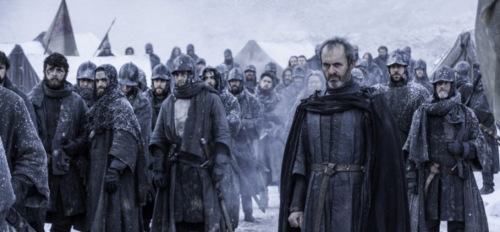
I think we also have to briefly mention what they didn’t adapt. Like, I talked about how Winterhell failed to truly adapt Theon’s ADWD storyline in the linked post, and Julia and I talk about it more here. But what didn’t get put on our screens at all was Sansa’s Vale plotline, and Brienne’s riverlands plotline. There’s actually indications that we’ll “get” them in Season 6 (I put it in quotes because I can promise you, however they do it won’t make sense or bare passing resemblance to the books), which means Winterhell was just shoving these characters into a holding pattern. Why? To fit the one thing they did adapt: Ramsay getting a bride to rape. And according to Cogman, the girl being Sansa increases audience buy-in, because who could give a shit about anyone else?
Why did they make the adaptational choices they did?
Shock.
Seriously, it’s the only thing I can think of. I guess we could say that they wanted to set up a new “super villain” on par with Joffrey, so they needed to make Ramsay Sue SUPER intimidating to us, but was actually necessary to do this with a guy who spent Season 3 peeling off layers of Theon’s skin? And contorting the narrative so that he and a team of 20 men can take out provisions for an entire army is not something that makes him badass. It makes him hilariously unrealistic.
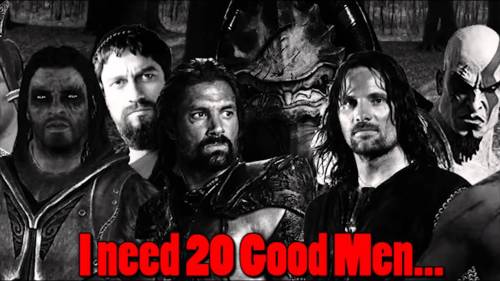
There’s also the chance that D&D thought that Sansa and Brienne’s story lines weren’t “cinematic,” or that they really needed to start paring down the plot as we’re entering the final few seasons (2? 3? Let this stupid thing end) so killing off Stannis’s campaign was necessary. Again…there’s a chance that Sansa and Brienne are “getting their arcs” in S6, so I can’t really comment on it. I also would say that even if they felt they had to do this, it doesn’t explain why every single character’s actions were just random and molded to fit the Fable of Ramsay Sue. Stannis’s defeat had to be that ridiculously contrived?
Also, I refuse to believe that anyone could think what we saw was remotely interesting television in comparison to the plotlines that were left out. Winterhell was just a horrible place where horrible things happened and every time we’d revisit it, it’d be more suckage. And our only respite from the brutality was the main abuser getting quality time with his dad. Seriously, what are we supposed to make of this?
So I’m going to settle on “shock” as being D&D’s motivation for adapting what they did. I actually have a feeling that Stannis dies way later on in the books. I don’t know if he is complicit in Shireen’s burning or not (definitely not in the context we saw), but I think that like…D&D wanted to get rid of Stannis because they didn’t care about him. And the audience probably didn’t care about him because, let’s be honest, he was never scripted well or accorded any decent amount of screentime. But they heard about Shireen’s burning and knew it would be a Shocking™ moment so they just threw it in, because they like their gasps.
How did those choices change the story?
This is actually a bit of a difficult section for me. I mean, I don’t even know what this story is. Like, I’ve mentioned Ramsay’s father/son narrative, which is somehow the focus. But it seems completely out of place in the rest of the Winterhell arc, which from what I can tell is just “abandon all hope.” Shitty things keep happening to people. Then we get a scene where we’re fooled into thinking there might be be a break from the shittyness, but no. Just more shit.

In some ways, Stannis’s “no good very bad day” serves as the perfect microcosm for the season. A bad choice is made that is entirely divorced of logic, and awful things happen as a result, especially to women/girls. The burned and broken bodies of Shireen and Selyse are all too similar to the bodies of the North Remembers Lady and Myranda, though unlike Stannis who gets to limp away from the battlefield to die a dignified, off-camera death, Sansa carries her bruises and brutalization with her over the wall, serving as an object for a man’s redemption. But of course, it’s her choice that’s going punished, as Cogman was quick to point out for us.
So I have absolutely no clue how to answer the question “how does this change the story?” because this in no way even resembles what Martin wrote. “Theon jumps over the wall with a rape victim” is not what makes a story. This is why I’m convinced “Shireen burns,” the TWOW “spoiler” that D&D tactlessly confirmed, is in no way going to resemble how it happens in the books.
I’m really not trying to be lazy here, but I’m just realizing that discussing the book plots doesn’t even have a place in Winterhell. Julia and I already wrote a piece that discusses Theon, Brienne, Stannis, and Sansa’s AFFC/ADWD plotlines and how Season 5 gave us the opposite point, if you’re interested. But at the end of the day, how did these adaptational choices change the story? Well…they weren’t making adaptational choices. They were writing their own story that has absolutely no logic, no meaning, and no point, aside from perhaps Ramsay earning his place as his father’s heir, which wasn’t even resolved on-camera (let’s just assume Roose enjoyed the 20 Good Men).
What in the actual fuck were they thinking?
That brings me to the last question, a question that I added. Because given that this was a page-1 rewrite, how in the actual fuck could they think this was something anyone wanted to see?

If I’m being really, really generous, then we can pretend that they were trying to do Theon’s arc justice. Yes, that means prioritizing it over Sansa and Brienne (a troubling choice in and of itself), but then that means their thought process was at least something akin to “how can we bring Theon’s story to life.”
However…they didn’t bring his story to life. I pointed out above that he’s not the central character, and that the scripting of Theon was molded to the needs of Ramsay Sue’s character. Add to that the exclusion of the Northern Lords, of the Weirwood tree, of the mysterious killer within the walls…no. It seems almost irresponsible of us to pretend this had anything to do with Theon’s ADWD arc when it would require us to ignore every single factor past “Theon interacts with a brutalized wife of Ramsay.”
“We really wanted Sansa to play a major part this season. If we were going to stay absolutely faithful to the book, it was going to be very hard to do that. There was as subplot we loved from the books, but it used a character that’s not in the show.” —David Benioff
“You have this storyline with Ramsay. Do you have one of your leading ladies—who is an incredibly talented actor who we’ve followed for five years and viewers love and adore—do it? Or do you bring in a new character to do it? To me, the question answers itself: You use the character the audience is invested in.” —Bryan Cogman
This is the supposed thought process. It’s a lie. And we know it’s a lie because literally nothing in Winterhell resembles this subplot other than Ramsay getting a wife to rape. They wrote this story for one purpose: raping Sansa. They did it because they knew the audience was invested in her. My guess is they threw in the father/son stuff as an attempt at nuance, or literally something to fill the time because in absence of the internal tensions with the Northern Lords, the intrigue of Abel, or an intimate look at Theon’s slowly healing mindset, there’s not a whole lot left to stick on our screens.
I don’t think you understand: it would make as much narrative sense to use Sansa’s Vale plotline and have Ramsay and Theon turn up as knights for the upcoming tourney.
In terms of what were they thinking with Stannis, they were thinking that they wanted him to exit stage-left. How could they efficiently and thoroughly get rid of him, but yet leave plenty of Bolton forces so that next season, the “real” good guys could take them on and it would become that much more impressive.
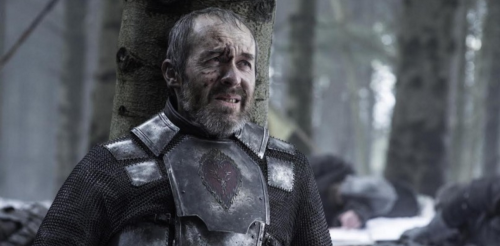
I like to imagine the moment where one of them suggested “hey, we could just have Brienne follow Sansa north and then she could be the one to kill Stannis.” I bet they thought that was clever writing. It just all fits together so well, doesn’t it?
It would have made as much narrative sense as if Brienne continued her quest in the riverlands and it was Stannis, Davos, and Mel that she fought at the Whispers.
It would have made as much narrative sense as if they kept Davos’s trip to White Harbor, but Petyr had somehow positioned himself in charge of the Merman’s Court.
It would have made as much narrative sense as if Mel stayed at the Wall and Sansa came riding in on a grey horse and Jon married her off to a Thenn.
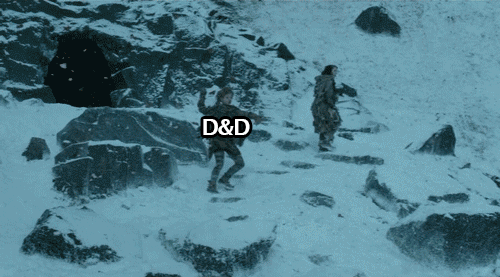
So given that, once we divorce ourselves from the notion that their line-of-thinking had anything to do with the books, we now have to ask: “what in the fuck were they thinking?” in and of itself.
HOW could they have thought this would be good TV? What on earth was supposed to be enjoyable about it? It was perhaps the single most depressing plotline I’ve ever seen. The one ray of sunshine was maybe the presence of Walda and her out-of-place decency and seeming optimism. But then Roose basically co-signed her death sentence when he told Ramsay about her carrying a boy. Also she was only in two scenes, one of which was immediately followed by an exchange where she became the object of fatphobic humor.

What else was there to enjoy? Were we supposed to like the father/son bonding of two characters who are most known for stabbing Robb Stark and torturing Theon/flaying innocents (respectively)? There’s a difference between a fleshed-out antagonist and a prioritized antagonist.
Were we supposed to enjoy watching Sansa get slapped around by the plot over and over in an attempt to…what? Teach her humility? Because that Darth Sansa chick thought she was all that…she thought she was “Sansa Stark of Winterfell” who couldn’t be scared. So how refreshing to see her punished.
Were we really supposed to care about the outcome of a battle where one side was being led by someone who burned his own daughter alive, and the other was being led by a rapist/flayer?
And HOW was the resolution of Theon killing another (albeit very mean) abuse victim supposed to be in any way satisfying?
For me, it was beyond Darkness-Induced Apathy. I was actively in a state of dread when Winterhell would appear on my screen. I just wanted to get it the fuck off. And insult to injury, when you managed to look past the just overwhelming vibe of “everything SUCKS” and the triggering content, the plot itself made NO sense. There was NO reason for anyone to be acting the way they were. Shitty things just continued to occur and it got worse and worse for no overarching purpose.
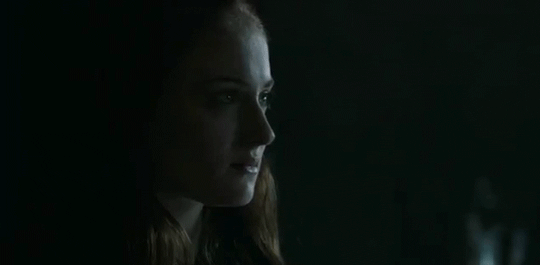
I don’t know what they were thinking, truly. My best guess is that D&D are operating under the assumption that what draws people to the show…what people really like, are those moments that make them gasp and go “I can’t believe it!” We know they wanted to adapt the entire series for the Red Wedding.
I’m not sure if we were supposed to find Sansa’s rape surprising. Anyone who read the books understood what this role meant for her. It was just supposed to horrify us? And that was supposed to somehow make us care? They did try and mislead us in the episode, by having Sansa assert to Myranda that she was, indeed, “Sansa Stark of Winterfell” and couldn’t be scared, in the most blatant example of faux-empowerment the season had to offer. I guess they just thought Sansa’s violation would really “up the stakes” for us…but then they positioned Stannis the child-murderer against the Boltons.
I will say Shireen’s death was definitely supposed to surprise us, which is why we had scenes of Stannis hugging her and asserting how much she meant, and how he wouldn’t think to send her off to that leper-colony in Valyria that totally makes sense to exist. I mean yeah, it was in his stiff, Stannis way, but it was intended to leave us “shocked” when he would then decide to just up and burn her. And it was “shocking” in the sense of “how does it make any sense for him to do this?” It was “shocking” in that “the Stannis we know would never do this.” But that’s not good shocking. I’ll let Mr. Martin explain why not:
“It’s easy to do things that are shocking or unexpected, but they have to grow out of characters. They have to grow out of situations. Otherwise, it’s just being shocking for being shocking.” —George R.R. Martin
I also think D&D believe that feeling of “oh no how could they DO this” draws people in. You know, playing into their famous “if you think this has a happy ending, you haven’t been paying attention” line (which is not nearly as clever or interesting as they think it is). And like…Winterhell gave that to us in spades.
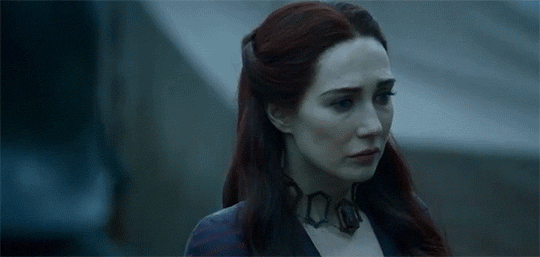
But because of the lack of logic to move all these characters into these positions, and the completely arbitrary ways in which they acted, there was no way to root for anyone. Or even be that upset at the in-verse characters (which is what happens with good shows…suspension of disbelief), because the nonsensical nature of it all only makes us very aware that the writers are the ones fucking up.
Viewers of good shows don’t spend a lot of time thinking about the writers during the program. Like, if it’s bad enough to get our attention, that’s a problem.
Conclusion (I guess)
I don’t want to end this on a whimper, but I honestly don’t know what else to say. I’ve called this the “most misogynistic plotline” in the entire show, and given the following, that’s hard to argue with:
- The only part of the story adapted was the rape
- D&D accidentally pitted two abuse victims against one another
- Women only asserted themselves to other women and were put into place by men
- Only women were harmed within the walls of Winterhell
- Selyse’s death was treated as a joke, Shireen’s death was a cheap 180 for a “shock” (again…a story told on the backs of women)
- Sexist tropes employed in the writing:
- Infantilization
- Damsel in distress
- Damned by comparison
- Badass women aren’t feminine
- Weaponized sexuality (Myranda’s ability to “make Ramsay hers” vs. the “Madonna” Sansa who failed to do so)
- All women are catty
- Beauty is never tarnished
- Madonna-whore complex
- Rape is drama
- Commodification of women’s bodies
I got an ask not long ago about, what do I think? Is this plotline more offensive than Porne? I mean, there’s no easy answer (the racial implications of Porne alone…). But what I will say is that the deeper I’ve examined this Winterhell plotline, the more offensive it becomes. Not just because I’m discovering gems I had previously overlooked, like the victim-blaming narrative originating in the conversation between Brienne and Sansa, or the “accidental abused wife” narrative that I had somehow missed.
No, Winterhell has become more offensive because there’s no point to it. Let’s be honest, the father/son narrative with Ramsay is being generous. At best it’s in there to pad this horrible, horrible plotline. At worst it was somehow supposed to get us to sympathize with Ramsay, which I really don’t see anyone in their right minds scripting.
But every other thing was just so carelessly thoughtless. So blatantly thoughtless.
And if THAT’s how you’re approaching a plotline where the ONLY thing you’re adapting is rape, then THAT is a major fucking problem.
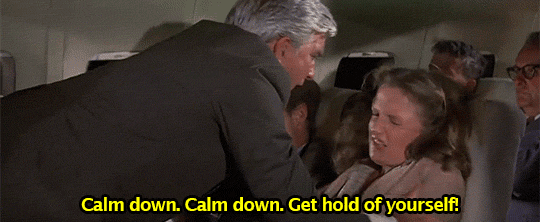
All Game of Thrones retrospectives can be found here.

